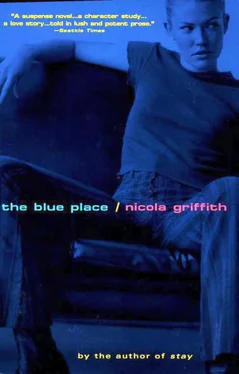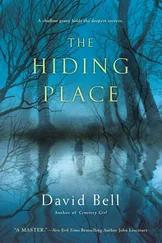I took notebook and pencil from my jacket pocket and made notes as I read. Phone memo: on April tenth, David Honeycutt asked Lyon Art to ship the Friedrich to Mantes-la-Jolie (a careful annotation in Julia’s hand read: twenty-five miles from Paris ), to provide insurance and security, and to have the painting in France before the end of the month. Receipts indicating that Honeycutt handed the painting over to Lyon Art on the twelfth. I jotted, Who brought? What transportation? Directly hand to hand ? and went back to the notes.
Perhaps half an hour later the door opened and Annie came in. “I’ve paged her. She should be here soon.” She picked up my empty coffee cup, nodded with approval. “More?”
My forehead felt tight from lack of sleep and too much beer. Not something caffeine could fix. “No, thank you.”
Julia’s later notes were all handwritten. The prospect of the painting being a fake, of her having made a mistake, had understandably led to a desire for privacy. Handwritten notes were much more secure than any computer hard drive. I was willing to bet, though, that Annie Miclasz already knew everything in this folder.
When I had read everything I went to the window and stared out. Peachtree Street was, architecturally speaking, a virtual John Portman fiefdom. Typical of his New Atlanta, One Peachtree Center rose diagonally across from the window: arrogant, too big, erected without any consideration for neighbours; its open metalwork spire glinting wasteful and golden in the late morning sun. To the left was another of his monstrous towers with its buff-coloured stone and mean, prisonlike windows, linked—by those silly glass sky bridges that Dornan, a friend of mine, refers to as gerbil tubes—to the Mariott Marquis and the Gaslight Tower. People scurried back and forth looking nervous; below, the streets seethed with traffic even though it was not remotely near any kind of rush hour or even lunchtime. I wondered idly what kind of damage a couple of antipersonnel mines would do to those tubes and the street below.
Atlanta was a big city getting bigger every day: three million people living, breathing, working, cutting down trees and spewing out waste. This week there was one less than there had been: Jim Lusk, Ph.D., ASA, ISA. Where did he fit in the story of the fake painting, the very suspicious cocaine, and the banker? The police were no longer looking; they were only too happy to believe the soured drug deal story, but drug dealers would not leave several hundred thousand dollars worth of product lying around for the police to pick up.
Murders are committed for a variety of reasons but, given the supposed worth of the painting, and the cocaine, I would bet on money, power, or a warning—or a combination of all three. The question was, whose money, whose power, and who was being warned, and about what?
Ask any airline attendant and they will tell you that the worst passengers are always from first class: corporate CEOs who defecate on aisle trolleys and wipe themselves down with linen napkins when their third bottle of wine isn’t brought fast enough; the seventeen-year-old daughters of Arab sheiks who pinch and slap attendants who can’t provide Belgian chocolates. They have money and power and are used to the world conforming to their every whim. Lusk’s murder, like every other, came down to the same thing: someone out there believed that the rules everyone else obeyed did not apply to them.
The door opened behind me. Julia. No coat, hair in a French braid so tidy that either the wind had stopped or she had taken the time to replait it after arriving. She was sipping from a large coffee mug: probably already briefed by Mrs. Miclasz.
“I’m so sorry you have had to wait.”
I nodded over the file still on the chair. “It’s been fruitful.”
“I imagine you have questions.”
“I do. But let’s discuss them over lunch. I didn’t have time for breakfast.”
“Certainly, but there is one formality we should attend to first. The fee.” Here on her own turf she looked different: more whole and competent; denser somehow.
I had no idea what private investigators charged. “One twenty-five an hour, plus expenses, with a three-thousand-dollar advance.”
“The advance is fine, but I can’t pay more than eighty an hour, and the only expenses I’ll allow are travel.”
“One hundred, travel and food.” I smiled and added, “I’ll buy lunch.” I didn’t need the money but, judging by the rates she charged for her own services, she could afford it.
She gave in gracefully enough and asked Mrs. Miclasz to draw up a contract. It appeared in suspiciously short order. “Do you hire investigators often?” She shrugged, which I interpreted as no. I read it carefully—it seemed straightforward enough—and we both signed. Mrs. Miclasz then cut a cheque, one of those oversized corporate things that I had to fold twice to get in my pocket.
The old Murphy’s Restaurant had reminded me of the lower decks of a nineteenth century sailing ship: hot and airless, with cramped alcoves and no headroom. Five years ago, they had moved to specially built quarters just across the street, and Julia and I took a table by one of the many long, open windows where the spring air—softened, now that we were out of the canyon streets of downtown, to a gentle breeze—wafted pink and white dogwood blossom over the flagged floor, and where sunlight made me want to blink and stretch like a cat.
I ordered mixed greens with oregano garlic dressing, followed by lemon chicken and wild rice. “And please bring some bread meanwhile.” Julia pondered the menu, her blue eyes the colour of faded ink in the strong sunlight. I sipped idly at my water, felt a sudden flush of desire as a bare-midriffed waitress eased by and reminded me of Mindy’s pliant body under my hands.
Never mix business with pleasure. I thought deliberately about the fire, what it would have done to a human being. “Somebody out there killed Lusk for a reason. Do you have any ideas?”
“No. But the whole drug idea is ridiculous.”
“Yes.”
“You agree?”
“The cocaine was a plant. Did Lusk have any enemies—or any friends, lovers, ex-spouses who might want him dead?”
“No. Or at least not to my knowledge.”
“How good a friend was he?”
“Good.” A pause. She made a visible effort to let down her barriers. “Getting better. We met ten years ago, at Northwestern. He was one of my teachers. We kept in touch. When I moved to Atlanta six years ago, we had lunch. We had lunch regularly. Sometimes we had supper at his house when he had a rare painting or sculpture for me to look at. It doesn’t sound like much, but for him it was. He was a kind, gentle man. Shy. I think it took him all those years to realize I didn’t want anything from him except friendship, to share his knowledge and love of art. But he was beginning to unbend. We’d been talking about maybe going to Memphis together this summer to see that Moderns exhibition. He doesn’t like to travel, but he was so excited….” She looked fixedly out of the window.
I didn’t want her to cry before I’d had something to eat. “Were you romantically involved?”
“No.” It came out clipped and glacial. I could imagine the half-formed tears freezing across her cornea.
“What do ISA and ASA stand for?”
“The International Society of Appraisers and the American Society of Appraisers.”
“That’s how he earned his money?”
“Yes. As I said, he didn’t like to travel very much, he hated to fly, so he told me he made his travel rates quite ridiculous, but every now and again there would be a particularly difficult identification problem somewhere like New York or Vancouver and a client would be willing to pay his huge fees plus the expense of travelling by train, first class.”
Читать дальше












